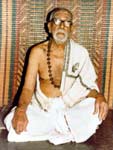|
MEANING OF SIVARATHRI, BASED ON THE TRADITIONAL FOLKLORE
Most readers must undoubtedly be
aware of late Dr. G.V Subba Rao, till recently a familiar
figure in the Ashram. Many may also know that it is Dr. Subba
Rao’s father, esteemed Ghandikota Subramania Sastri,
to whom we owe the famous SAI GAYATHRI. We reproduce below
the English translation of an article by Subramania Sastrigaru
that originally appeared in the Telugu edition of Sanathana
Sarathi. In this article, Sastrigaru gives us the traditional
explanation and significance of Mahasivarathri.
 The
Universe is a play enacted by God for God. Precious stones
shine in multicolored brilliance without any effort or expenditure
of energy, and God manifests as this and many such marvels.
To descend as an Avatar by taking
on a body for fostering the good and the loyal, is but a phase
of His playful mood. The
Universe is a play enacted by God for God. Precious stones
shine in multicolored brilliance without any effort or expenditure
of energy, and God manifests as this and many such marvels.
To descend as an Avatar by taking
on a body for fostering the good and the loyal, is but a phase
of His playful mood.
The Supreme One has two basic aspects. (1)
The Formless and Eternally Pure Universal Consciousness which
can be cognised from the Guru
and the Sastras [scriptures].
(2) The second is the aspect with Form which has two important
facets, the Universe itself and the Avatar.
Truly speaking, the Universe is His Embodiment,
though as long as ignorance persists this truth is not realized.
But when ignorance is dispelled, Jnana
reveals that what is taken to be the Universe is only the
Pure Consciousness Principle of Brahman.
In the Rudradhyaya of the Thaithiriya
Samhitha, (2d to 8th ANUVAKAS),
the fact that the manifested Universe is Siva, nothing more,
nothing less is clearly defined. Sarvam
Khalvidam Brahma and other axioms appearing in the
Vedas are all further dicta on
the same theme.
The second Formful embodiment is the Avatar,
as Siva and other Godly Forms. He appears in these forms in
order to chasten the wicked and encourage the good, and to
provide facility for the devoted to earn mental peace through
worship. The Siva-Form is paramount among these, because even
while fostering the good and the devoted, He is Pure Consciousness
and Bliss, since He is of the Sathwic
Guna, pre-eminently. Other God-forms have an inkling
of subtle Rajas and Thamas
and so, in the task of maintaining the Universe, they are
merged to the apparent detriment of their fundamental Reality.
This is the reason why Siva alone has the Lingam
as the Concrete Symbol, besides the usual Conventional Form
with weapons, accoutrement, multiplicity of arms and equipment
for the sake of the Mission. The Lingam
reveals the Fullness and the Illimitability of Siva. Siva
grants visions of Himself as the Lingam
or as having Karacharana etc.
Once upon a time, long, long ago, the Gods,
Brahma and Narayana as the story goes, were extremely jealous
of each other and argued loud that each was superior to the
other. They had come to the stage of a trial of arms, when
between them a brilliant Lingam of Light appeared! They were
stunned by the splendour and they decided among themselves
that He among them is superior to the other, who is able first
to see the beginning below or the end above of that magnificent
Lingam. Brahma rode on His Hamsa
[swan] and flew above; He could not see the crown of the Lingam
however high He rose. Vishnu took the form of Varaha
[boar] and dug into the nether regions but could not delve
into the base of that Lingam.
When they returned to earth, a Voice from the Lingam
asked them whether they had succeeded in their quest. Brahma
uttered a lie and declared He had seen the crown! Narayana
was about to concede victory to Brahma, when the Voice intercepted
Him and Siva manifested Himself from the Lingam,
with the full Divine Equipped Form described as “Hiranyabaahave,
hiranya varnaaya, hiranya roopaaya” in the scriptures.
He punished Brahma for the audacity and the falsehood. He
authorised Vishnu to correct wrong and promote right. The
Lingam that manifested on this
occasion is known as Jyothirlingam
and altogether 12 such have appeared according to tradition.
Two dates are important in this grand awe-inspiring
play of the Gods: (1) Ardra star-date
in Margasirish. when Lingam
of Splendour, without beginning or end appeared before the
two competing Divine Forces and (2) Magha,
dark half, 14th day, Chathurdasi,
usually known as Mahasivarathri,
when from that Lingam, Siva emerged
with all the Divine Qualities and Glories, to bless and chastise.
Mahasivarathri
is sacred because on that day, Siva first assumed His Mind-conquering
beautiful form emerging so from Symbolic Lingam;
Siva gave this Vision to the two great Divinities whom He
directs. So, worship of Siva on such a day is considered to
be of supreme importance.
To have the chance to worship Him at Puttaparthi
and witness the emergence of the Lingam
from Sri Sathya Sai Baba is indeed a unique Blessing.
From the Telugu
Article by Ghandikota Subramanya Sastri
|